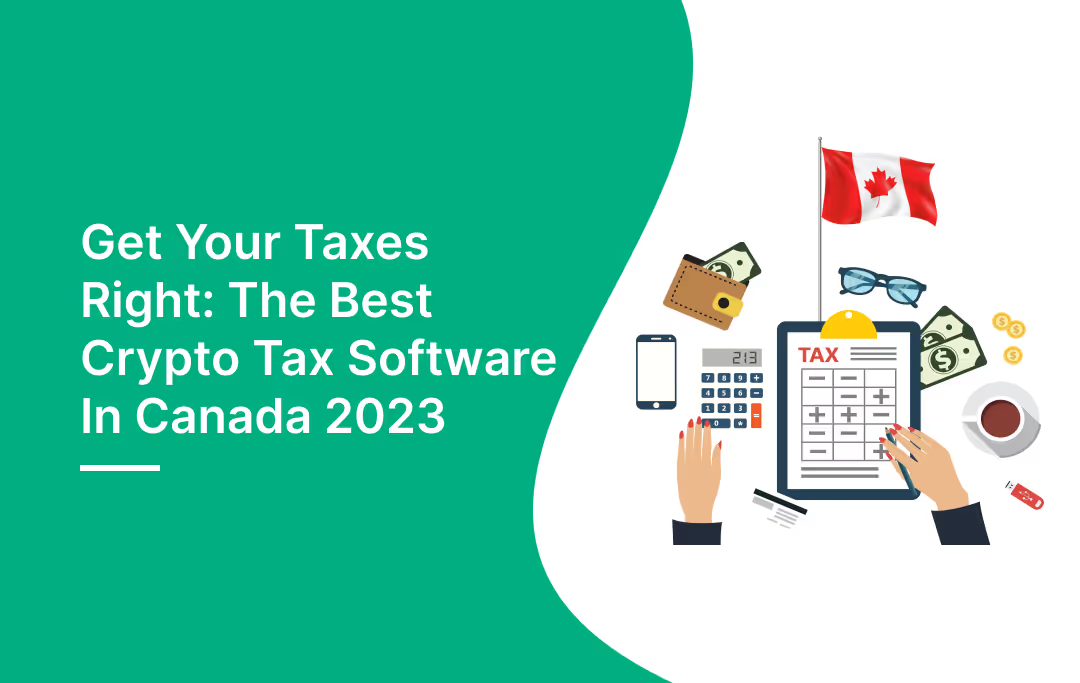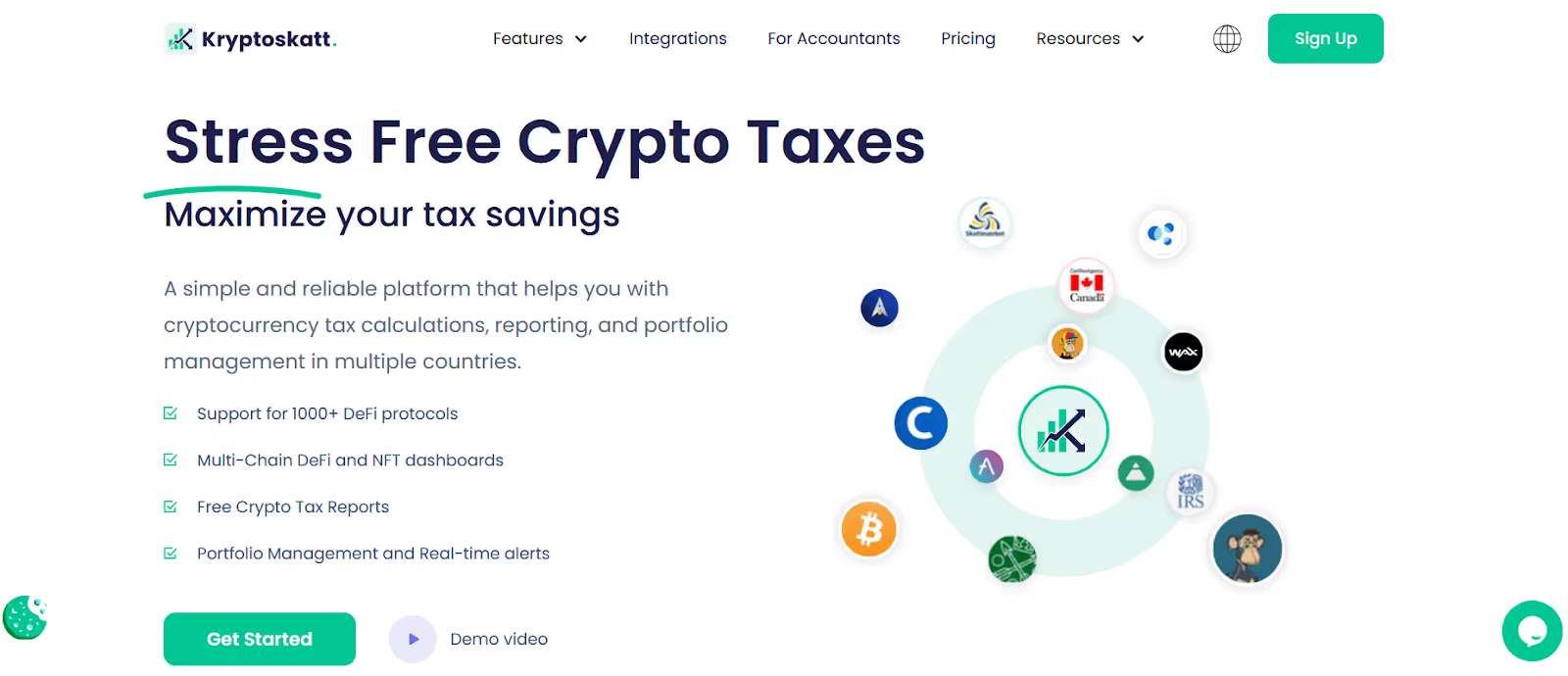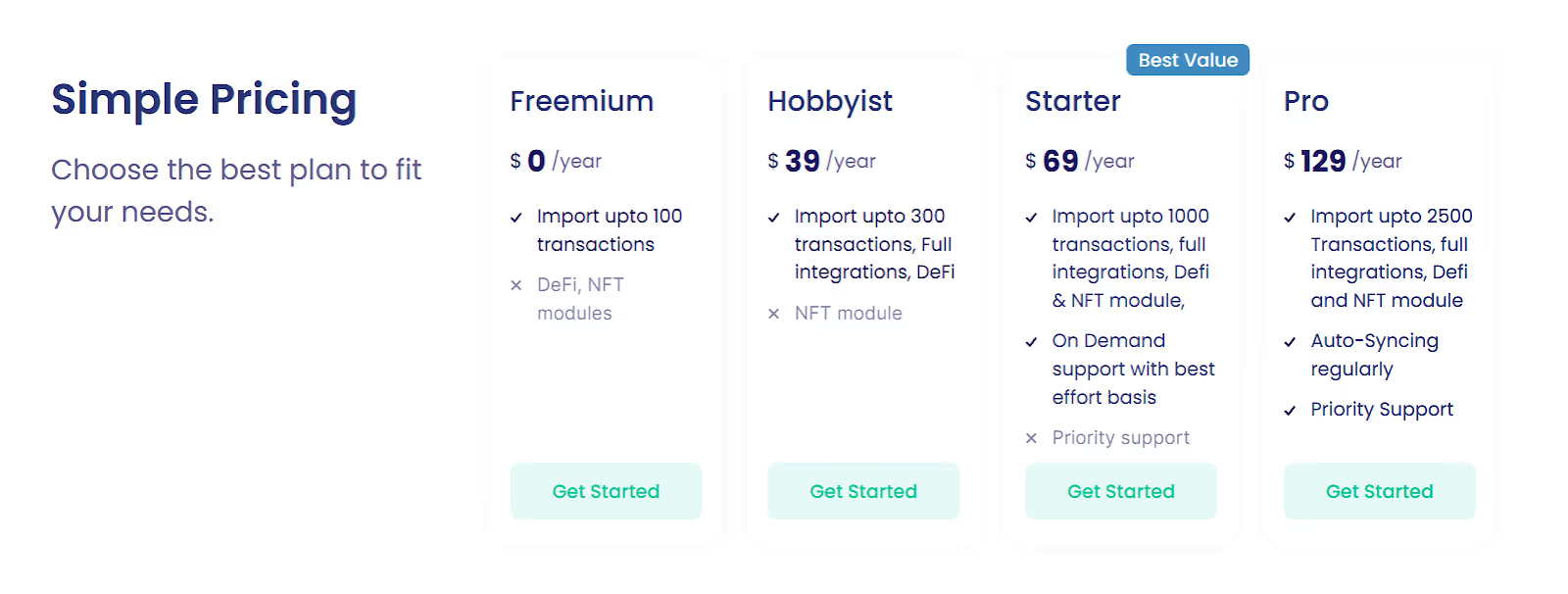
The crypto world is full of exciting opportunities, but it also comes with its fair share of complexities, especially when it comes to taxes.
As a Canadian cryptocurrency trader, you need to ensure your tax returns are accurate and compliant with the Canada Revenue Agency (CRA) guidelines. In this blog post, we'll explore the best crypto tax software in Canada for 2023 that can help you report your crypto taxes with ease.
What is a Crypto Tax Software?
Crypto tax software is a tool that simplifies the process of calculating and reporting your cryptocurrency taxes.
By importing your transaction data into the software, you can automatically calculate your capital gains and losses and generate the necessary tax reports, ensuring you stay compliant with the CRA laws.
However, not every crypto software is created equal, which is why it’s important to compare all the available options before making the final choice.
What Features to Look For in Crypto Tax Software?
When choosing the best crypto tax software in Canada, consider the following features:
User-Friendly Interface
A simple, intuitive interface makes it easy to input and manage your cryptocurrency transactions. Crypto software like Kryptos allows you to calculate your crypto taxes directly from their mobile app and manage your tax portfolios from a single dashboard.
Compatibility With Canadian Tax Regulations
The best crypto tax software in Canada should be compliant with the current CRA guidelines. In addition, the app must reflect any changes in the tax laws.
Integration With Popular Exchanges And Wallets
Seamless integration with your preferred exchanges and wallets streamlines the import of transaction data. The best crypto tax software in Canada must have maximum integrations to cover different applicable taxes defined by CRA.
Precise Tax Calculations
The best Canadian crypto tax software should accurately calculate capital gains, losses, and other tax-related figures. Dashboards to view all tax calculations and handle errors are helpful.
Accurate Reporting
Your crypto tax software should generate detailed reports that comply with CRA guidelines to facilitate tax filing.
Benefits Of Using Crypto Tax Software
Cryptocurrency taxation can be complex, as it involves tracking and reporting multiple transactions, often across different currencies and exchanges.
Luckily, you don’t have to do all this manually, thanks to the powerful crypto tax software available in the market.
Here are 4 ways crypto tax software can simplify your tax calculations.
- Automating calculations: Calculate capital gains and losses accurately, and handle other tax-related tasks such as tax-loss harvesting.
- Minimising errors: Reduce the risk of human error and ensure compliance with CRA regulations.
- Saving time: Reduce hours of gathering transaction data manually to just a few minutes and generate reports almost instantly.
- Providing insights: Gain a better understanding of your tax obligations and identify potential tax-saving strategies.
Best Crypto Tax Software in Canada: Kryptos

Kryptos is the best crypto tax software in Canada if you are looking to calculate your crypto taxes in just a few minutes and save maximum taxes.
The platform also has one of the highest integrations available in the market with more than 100+ wallets and exchanges, 50+ blockchains, 2000+ DeFi protocols, and even NFTs. It also offers all necessary tax reports defined by the CRA to cover different taxes including capital gains tax, business income tax, and even taxes on foreign properties.
So whether you are lending or staking your crypto, trading as an individual trader or business, Kryptos supports the necessary integrations and tax forms to calculate your crypto taxes accurately.
Kryptos Key Features
- One of the highest integrations available in the market with 2000+ DeFi protocols for importing different crypto transactions
- Auto-sync of all transaction data via API or custom CSV files from 100+ exchanges and wallets
- Intelligent detection to categorise all your transactions and analyse them accurately
- Auto-detection of transactions that can leverage tax-saving strategies like Tax-Loss Harvesting to save crypto taxes
- Dedicated DeFi and NFT dashboards to track and manage your digital assets portfolio and generate instant reports
- Mobile app available for easy calculation of your taxes
Kryptos Pricing
The platform has one of the most affordable packages available in the market along with a free plan which is perfect for beginners.

Here are the 4 available packages on the platform:
- Freemium- $0/year
- Hobbyist- $39/year
- Starter- $69/year
- Pro- $129/year
Calculating crypto taxes in Canada with Kryptos is as simple as choosing the right plan, linking your wallets and getting started. For more details, refer to Kryptos Pricing.
Wrapping Up
Before you choose a crypto tax software, consider points such as integrations supported, how friendly the UI is, and the pricing. The best crypto tax software in Canada will simplify your legal compliances and save you thousands in taxes.
With Kryptos, you can calculate your crypto taxes with just a few clicks, maximise your savings, and ensure you comply with the CRA tax laws at all times.
Ready to calculate your crypto taxes in a few minutes? Sign Up Now for free.
FAQs
1. How to file crypto taxes in Canada?
You can file crypto taxes in Canada using these 4 steps:
- Collect all transaction records from exchanges, wallets, and other platforms. You can do this manually or use crypto tax software like Kryptos.
- Calculate capital gains and losses from your transactions.
- Report your capital gains, losses, and other crypto-related income on the appropriate tax forms.
- Include these forms with your tax return and submit them to the CRA.
2. Which is the best crypto tax software in Canada?
The best crypto tax software in Canada to help you calculate your taxes in no time and ensure legal compliance is Kryptos. It also uses multiple tax-saving mechanisms to maximise your tax savings.
3. Do you get taxed on crypto in Canada?
Yes, cryptocurrency transactions are subject to taxes in Canada. Capital gains and losses from crypto transactions must be reported in your tax return, along with any income earned from mining, staking, or other crypto-related activities.
4. Are staking rewards taxable in Canada?
Yes, in Canada, staking rewards from cryptocurrencies are considered taxable. The Canada Revenue Agency (CRA) has provided guidance on how various cryptocurrency activities are taxed, and staking falls under these guidelines.
5. How do I report crypto income in Canada?
To report crypto income in Canada, include the relevant information on your tax return, such as capital gains, losses, mining income, or staking rewards. Use the appropriate tax forms, such as Schedule 3 for capital gains and T2125 for business income.
6. What is better than CoinTracker?
While CoinTracker is a popular crypto tax software, an excellent alternative for your crypto tax in Canada is Kryptos. Compare their features to find the best option for your needs.
All content on Kryptos serves general informational purposes only. It's not intended to replace any professional advice from licensed accountants, attorneys, or certified financial and tax professionals. The information is completed to the best of our knowledge and we at Kryptos do not claim either correctness or accuracy of the same. Before taking any tax position / stance, you should always consider seeking independent legal, financial, taxation or other advice from the professionals. Kryptos is not liable for any loss caused from the use of, or by placing reliance on, the information on this website. Kryptos disclaims any responsibility for the accuracy or adequacy of any positions taken by you in your tax returns. Thank you for being part of our community, and we're excited to continue guiding you on your crypto journey!
| Step | Form | Purpose | Action |
|---|---|---|---|
| 1 | 1099-DA | Reports digital asset sales or exchanges | Use to fill out Form 8949. |
| 2 | Form 1099-MISC | Reports miscellaneous crypto income | Use to fill out Schedule 1 or C. |
| 3 | Form 8949 | Details individual transactions | List each transaction here. |
| 4 | Schedule D | Summarizes capital gains/losses | Transfer totals from Form 8949. |
| 5 | Schedule 1 | Reports miscellaneous income | Include miscellaneous income (if not self-employment). |
| 6 | Schedule C | Reports self-employment income | Include self-employment income and expenses. |
| 7 | Form W-2 | Reports wages (if paid in Bitcoin) | Include wages in total income. |
| 8 | Form 1040 | Primary tax return | Summarize all income, deductions, and tax owed. |
| Date | Event/Requirement |
|---|---|
| January 1, 2025 | Brokers begin tracking and reporting digital asset transactions. |
| February 2026 | Brokers issue Form 1099-DA for the 2025 tax year to taxpayers. |
| April 15, 2026 | Deadline for taxpayers to file their 2025 tax returns with IRS data. |
| Timeline Event | Description |
|---|---|
| Before January 1, 2025 | Taxpayers must identify wallets and accounts containing digital assets and document unused basis. |
| January 1, 2025 | Snapshot date for confirming remaining digital assets in wallets and accounts. |
| March 2025 | Brokers begin issuing Form 1099-DA, reflecting a wallet-specific basis. |
| Before Filing 2025 Tax Returns | Taxpayers must finalize their Safe Harbor Allocation to ensure compliance and avoid penalties. |
| Feature | Use Case Scenario | Technical Details |
|---|---|---|
| Automated Monitoring of Transactions | Alice uses staking on Ethereum 2.0 and yield farming on Uniswap. Kryptos automates tracking of her staking rewards and LP tokens across platforms. | Integrates with Ethereum and Uniswap APIs for real-time tracking and monitoring of transactions. |
| Comprehensive Data Collection | Bob switches between liquidity pools and staking protocols. Kryptos aggregates all transactions, including historical data. | Pulls and consolidates data from multiple sources and supports historical data imports. |
| Advanced Tax Categorization | Carol earns from staking Polkadot and yield farming on Aave. Kryptos categorizes her rewards as ordinary income and investment income. | Uses jurisdiction-specific rules to categorize rewards and guarantee compliance with local tax regulations. |
| Dynamic FMV Calculation | Dave redeems LP tokens for Ethereum and stablecoins. Kryptos calculates the fair market value (FMV) at redemption and during sales. | Updates FMV based on market data and accurately calculates capital gains for transactions. |
| Handling Complex DeFi Transactions | Eve engages in multi-step DeFi transactions. Kryptos tracks value changes and tax implications throughout these processes. | Manages multi-step transactions, including swaps and staking, for comprehensive tax reporting. |
| Real-Time Alerts and Updates | Frank receives alerts on contemporary tax regulations affecting DeFi. Kryptos keeps him updated on relevant changes in tax laws. | Observe regulatory updates and provide real-time alerts about changes in tax regulations. |
| Seamless Tax Reporting Integration | Grace files taxes using TurboTax. Kryptos integrates with TurboTax to import staking and yield farming data easily. | Direct integration with tax software like TurboTax for smooth data import and multi-jurisdictional reporting. |
| Investor Type | Impact of Crypto Tax Updates 2025 |
|---|---|
| Retail Investors | Standardized crypto reporting regulations make tax filing easier, but increased IRS visibility raises the risk of audits. |
| Traders & HFT Users | To ensure crypto tax compliance, the IRS is increasing its scrutiny and requiring precise cost-basis calculations across several exchanges. |
| Defi & Staking Participants | The regulations for reporting crypto transactions for staking rewards, lending, and governance tokens are unclear, and there is a lack of standardization for decentralized platforms. |
| NFT Creators & Buyers | Confusion over crypto capital gains tax in 2025, including the taxation of NFT flips, royalties, and transactions across several blockchains. |
| Crypto Payments & Businesses | Merchants who take Bitcoin, USDC, and other digital assets must track crypto capital gains for each transaction, which increases crypto tax compliance requirements. |
| Event | Consequences | Penalties |
|---|---|---|
| Reporting Failure | The tax authorities can mark uncontrolled revenues and further investigate. | Penalty fines, interest on unpaid taxes and potential fraud fees if they are deliberately occurring. |
| Misreporting CGT | Misreporting CGT Error reporting profits or losses can trigger the IRS audit. | 20% fine on under -ported zodiac signs, as well as tax and interest. |
| Using decentralized exchanges (DEXs) or mixers without records | The IRS can track anonymous transactions and demand documentation. | Possible tax evasion fee and significant fine. |
| Disregarding Bitcoin mining tax liabilities | Mining reward is considered taxable income, and failure of the report can be regarded as tax fraud. | Further tax obligations, punishment and potential legal steps. |
| Foreign crypto holdings: Non-disclosure | Foreign-accepted crypto FATCA may be subject to reporting rules. | Heavy fines (up to $ 10,000 per fracture) or prosecution for intentional non-transport. |



